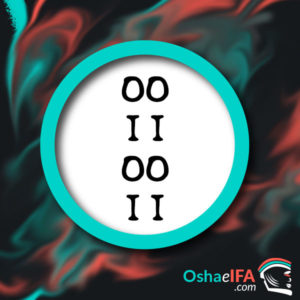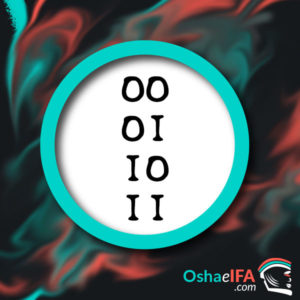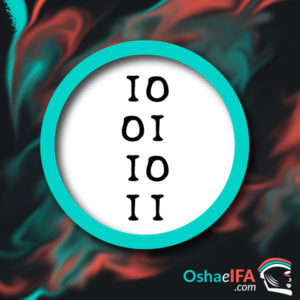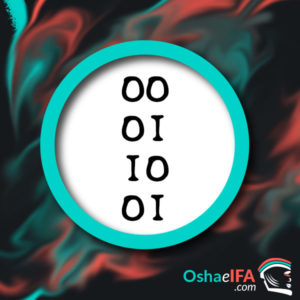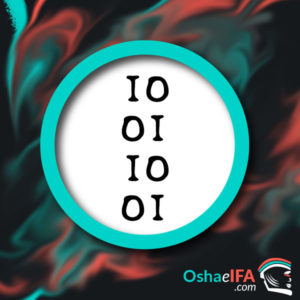Ofun Kana (Òfún Òkànràn)

Ofun Kana is the combination of the Greater Odu Òfún and Òkànràn. It invites us to act with prudence and respect towards others and towards spiritual traditions. Excessive self-reliance and disregard for the advice of elders can lead to ruin and isolation. Care in personal relationships, especially within a couple and between parents and children, is essential to maintain harmony and personal and spiritual progress.
Analysis and reflection of the Odu Ofun Okana
Ofun Kana stands out for its complexity and the severe warnings it presents. It is associated with moments of transformation and revelation, where the person is faced with the need for deep introspection to correct their path without initially realizing their errors. In this Odu, father and mother figures play critical roles, often influencing the fate of their descendants in unexpected ways.
Health:
From a health perspective, Ofun Kana warns of infectious diseases and chronic conditions such as gout, which can be exacerbated by inappropriate lifestyles such as excessive alcohol and protein consumption. Complications related to the genital organs and liver are prominent, suggesting the need to maintain rigorous hygiene and a controlled diet to avoid fatal consequences.
Personal Relationships and Love:
In the field of love, Ofun Kana (Òfún Òkànràn) underlines the importance of attention and dedication towards the couple. Negligence or inattention can lead to infidelity or discontent, leading to breakups or serious problems. The relationship between parents and children is also crucial; Misunderstandings or manipulations can deeply damage family ties.
Economic and Labor Aspects:
This Odu predicts possible legal confrontations related to accusations of theft or financial misunderstandings. Vigilance and compliance with ethical duties are essential to avoid falling into traps or injustices. Ofun Okana also points out the possibility of material prosperity if the advice of Ifá is followed and the necessary Ebbo are performed.
Religious Aspects:
Ofun Kana is a call to respect traditions and elders. Curses for disobedience and the loss of the ashé are recurring themes, reminding the faithful of the importance of following the prescribed precepts and sacrifices. The Odu suggests that a person's spiritual life can be the determining factor in overcoming obstacles and acquiring wisdom and divine protection.
General Description of the Odu Ofun Okana
Names or Aliases:
- Ofun Okana.
- Ofun Kana.
- Òfún Òkànràn.
What is born in the Ofun Kana odu?
- The Jet.
- That the children of Obatalá and Ofun Kana do not eat rabbits.
- Eating sandwiches.
- That Elegua fell ill with gout.
- The Social Plague.
- Orunmila's enemies wanted to harm him with the epó.
- The Awó dresses in mouse skin and the woman in tiger skin, to betray.
The Ifa Sign Ofun Kana points out:
- Another Awó or Santero falls in love with the Awó's wife.
- Olodumare granted Babalu-Aye the grace of cohabiting with all the obiní.
- Syphilis is acquired by contagion.
- The person corrects himself without realizing it.
- The Rat and the Mouse do not associate.
- The Bones were activated to work on religion.
- The man cannot live alone, he has to have his wife.
- The man is cool.
- The Bitch was in ruins.
Recommendations
- Perform introspection and self-correction – Stay attentive to your own actions and make positive changes.
- Maintain hygiene and controlled diet – Prevent infectious diseases and liver problems through a healthy lifestyle.
- Pay attention to your partner – Prevent discontent or infidelities by taking care of the love relationship.
- Respect elders and follow traditions – Honor traditional advice and practices to ensure spiritual support.
- Perform Ebbo according to Ifá prescriptions – Follow rituals and sacrifices to improve luck and avoid adversity.
- Avoid excess alcohol and protein-rich foods – To prevent conditions such as gout.
- Monitor the legal and ethical environment – Avoid getting involved in situations that could lead to legal accusations.
- Worship Oluo Popo a lot – Maintain a special devotion towards this deity to obtain protection and guidance.
- Using jet for the evil eye – Protect yourself against bad energy and envy using this amulet.
prohibitions
- Do not eat rabbits or corn – Follow specific dietary restrictions to avoid spiritual and health problems.
- Avoid negligence with the family – Prevent serious ruptures and misunderstandings within the family.
- Do not ignore symptoms or signs of illness – Pay attention to health problems before they become serious.
- Not being self-sufficient to the extreme – Recognize the need for support and advice from others, especially authority and spiritual figures.
- Do not get involved with people of dubious morality – Avoid associations that could damage reputation or lead to false accusations.
- Beware of contagious diseases with women from the lower world – Avoid relationships that can lead to venereal or other diseases due to risky associations.
Sayings of Ofun kana
- Nothing has been written about cowards.
- Loss of vigor.
- If you put yourself to the test and do Ebbó, it will turn out fine.
- The God of Heaven will put another person in his place.
- The sexual debauchery, he loses it.
- The mother, in her eagerness, harms him.
- The opportunist loses the ashé.
The saying "Nothing has been written about cowards" reminds us of the importance of courage in life. Evoking the idea that history and collective memory tend to honor those who dare to face challenges, while oblivion covers those who avoid taking risks and acting with courage.
You can read: Ifa Okana Fun Sign
Ifa says: Odu Ofun Kana
In the Odu Ofun Okana, the importance of jet as a protector against the evil eye is highlighted. This sign warns about the risks of neglecting personal hygiene and eating habits, which could lead to serious illnesses or even losing everything. Care is emphasized in social interactions, especially with individuals of dubious morals, since contagious diseases and legal complications due to improper associations are a latent risk.
Family and home must be priorities; Neglect in these aspects can result in significant losses, including the respect of loved ones. Ofun Okana calls for personal reflection on one's actions, especially in the context of intimate relationships; Irresponsible acts or debauchery can have direct and personal consequences.
This Odu also urges avoiding complacency and a sedentary lifestyle, promoting regular visits to the doctor to prevent health problems derived from parasites or viruses. Debts, both moral and financial, must be settled to avoid severe spiritual repercussions. Respect for the religious beliefs and practices of others is crucial to maintaining personal ashé and avoiding curses.
Prayer of the Odu of Ifa Ofun kana:
Ofun kana Okana biofun awado de ifá omó ni yare awado ifá obiní yanyara abure, omó awó be Okana yabun bofun kuin yakun omó beife yorobafun Okana biofun Ofun kanan obiní Okana moyáre awó Okana biofun. Ofiera koya abo niloso Adifafún osoko layu oma aboyo abo lebo, kaferefún Obbatalá ati Eshu.
Ebo of Ofun kana to defend oneself from aggression
The Ebbó for defense and victory over adversaries is made up of several powerful elements, each with its specific purpose within the ceremony:
- Akukó fun fun (white rooster) y eyelé fun fun (white dove): Offerings to Obatalá, symbolizing purity and peace, seeking his protection and support.
- white rabbit: Represents innocence and is used to appeal to justice and mercy in confrontational situations.
- A paoyé (cape), akofá (spear), and malaguidí (doll): Elements of protection and attack, they represent the tools to face and overcome obstacles and enemies.
- They were malú (beef) y malú adofá (beef liver): Source of strength and vital energy, crucial to face challenges.
- Gbogbo iguí (all suits): They include sacred woods such as Tomb Four, Dominator, Victor, and Battle Victory, which are used to overcome and dominate adversities.
- Ekú (dry mouse), ejá (dried fish), agbadó (corn), oñí (honey), otí (liquor), obi (kola): Ingredients that serve to appease the orishas and gain their favor in battle.
- Bogbo ileké (all necklaces) y ashó timbelara (clothing): Symbols of protection and religious belonging.
- Itaná meyi (two candles) y opolopó owó (a lot of money): Candles illuminate the spiritual path and money is used as an offering to ensure spiritual support.
- Lerí osiaddíe umbeboló in the Ebbó (chicken head used in the ritual): It means the subjugation of enemies and problems to the will of the practitioner.
During the ritual, the names of enemies are tied to sacred sticks, and prayers are recited to neutralize their negative influence. All of this is prepared and offered under the guidance and blessing of Obatalá, seeking not only protection but also justice and victory over adversity. This Ebbó is performed with a clear mind and a pure heart, strictly following the guidelines established by the Yoruba tradition to guarantee its effectiveness and respect for the spiritual forces involved.
You can read: Ofun Meyi, Oragun
Meaning of Oddun Ofun Kana
Jet is fundamental in the birth of this Oddun, always being included in the charge of Elegbá. Ofun Kana is an Ifá of introspection and inadvertent correction. The person under this sign must take care of their eyesight and legs and protect themselves from infectious diseases such as syphilis, which they could contract by contagion. Those close to him could distance themselves out of fear.
It is recommended to apply Ogú to everyday materials and especially venerate Oluopopo. This Oddun suggests a predisposition to accidents in the water and situations of moral doubt. Women, in particular, could face risks of losing their children due to Ogú.
It is vital that a man attend to his partner with dedication to avoid slip-ups and situations of adultery, since carelessness could lead to serious diseases of the genital organs and complications that could be fatal. Oshún presents herself as a savior in critical situations.
It warns about taking care of the liver and other organs, which could be affected by infections. Cleanliness and caution when eating food, especially organ meats and questionable meats, are essential to avoid serious complications.
This Ifá also warns about possible involvement in legal matters, even for acts not committed directly by the person, but through associations with third parties. A correct Ebbó could be crucial to passing these tests.
Ofun Kana talks about duality and movement. In a family context, it may happen that the mother unintentionally causes harm to the child. This sign also warns about the consequences of disobedience and the loss of Ashé, where the man could lose his ability to focus and achieve his objectives.
Conflicts between siblings, whether blood or religious, could arise from excessive self-esteem, leading to disputes and resentments. Children could emotionally manipulate their parents, which eventually turns against themselves, like a boomerang.
You can read: Treatise of the Sign of Ifa Ofun Nalbe
Pataki of the sign of Ifa Ofun kana:
The Lesson of the Awó
There was an Awó who lived with his wife and in the back of his house he had a workshop where he spent hours working until late into the night. While he was in his workshop, his wife was left alone at home. One day, another Awó visited the house and tried to court the first's wife. She rejected his advances, asserting herself as a faithful and decent woman. However, the insistent Awó finally managed to seduce her. From then on, she began to get ready daily and left the house while her husband worked, returning just in time to prepare her husband's food.
One day, the Awó of the workshop decided to have an Ifá reading and discovered infidelity. Astonished, he returned early from the workshop and waited for his wife. At dusk, when she entered the house and found him waiting for her, he was visibly frightened. To her surprise, he revealed to her that he knew about her cheating, her pregnancy, and told her that she should leave home. From that moment on, the wife's life became difficult.
Explanation: History teaches us about the consequences of dishonesty and infidelity. Although we may think that deceptions remain hidden, the truth always finds a way to come to light, and its repercussions can drastically alter our lives. In addition, it highlights the importance of trust and transparency in the relationship.
Ofun Kana Ifa Traditional Nigerian
ÒFUN ÒKÀNRÀN
Agogo ní n ró e pé péré
Àràn gèjè ní n ró mò k como jo mò k como jo
A day fún Kóórì
Èyí tí n fomi ojúu sògbérè omo
Òun le romo bí báyìí?
Wón ní ó rbo
Wón ni àgbédò adìe lebo
Ló bá pa adìe funra è
Nbè náà ló ti sè e
Nbè náà ló ti je é
Kò romo kankan bí
Ó tun dèèkejì
ó tun pa adie
Ó tún da a je
Kò romo pin
Nígbà or dèèketa
Ó bá loódò Òrúnmìlà
howu!
Wón ní kóun ó fi àgbébo adìe rbo léèkíní
Òún fi rubo léèkejì
Wón sì ní àwon omo n tèlé òun kíri
Òrúnmìlà niwo Kóórì loò seun
Ò n pa bye
O yes n da a je
Òrúnmìlà ní kí Kóórì ó lòó fi ìdodo kan ògiri
Lénu ibi ti ìdodo è bá ga mo lára ògiri
Kó sàmì Síbè
Kó waá pa adìe mìíìn
Kó mú axis adìe òhún
Kó fi yí ojú àmí ohun
Kí èjè adìe or wáá sàn wálè
Kó sì ta epo say yes ojú ibè náà
Òrúnmìlà ni kó mó je nbi adìe
Òrúnmìlà ní tí ò bá ti je nbè
Àwon omo or tèle
Kóórì bá se béè
Ó bá kó gbogbo àwon èèyàn jo
Ko je nnu è
Omo bá dé
Kóórì bímo yè
Ní bá n jó ní n yò
Ní n yin àwon Babaláwo
Àwon Babaláwo n yin Ifá
Ó ní béè làwon Babaláwo tòún wí
Agogo ní n ró e pé péré
Àràn gèjè ní n ró mò k como jo mò k como jo
A day fún Kóórì
Èyí tí n fomi ojúu sògbérè omo
You sì n rolled tí ò romo kó wálé
Or the nígbà èèkínní
Béè ni ò romo mú wálé
Or the nigbà èèkejì
Kò romo mú wálé
Ni on bá n korin fún Kóórì
Wón n pé bí o lo
ko moo lo
E jé Kóórì ó rodò
Bí or lo kó móo lo
Or japan
or jetan
o jèdi
ó jèdò
Bí or lo kó móo lo
Wón ni bí ti n padìe ni n dá je é
Ìgbà èèketa lÒrúnmìlà se Ifá fún Kóórì
Ó ní Kóórì or
Ó mò dé arewe yò
Fún mi lomo kan n gbé jó.
Ifá advises this person to offer child sacrifice. He should not be stingy. There is a particular enigma, which the family or friends of this person do not know the solution. They must have the help of the elders.
Gather together is the sound of the gong
Àràn gèjè sounds 'I will gather children'
They were the ones who made divination for Kóórì
The one who cried for children
I will have children on earth was what he asked Ifá
And they advised him to offer sacrifice
An adult hen is the sacrifice
She would kill her herself
Build a pot where she will cook it
And it is in that same pot that she will eat it
She didn't get to have any children
She knocked on his door for the second time
She killed another adult chicken
And she ate it alone
And couldn't find a way to have a baby
So on the third occasion
She went to consult with Òrúnmìlà
And she asked: 'Why has this misfortune clouded me?
'They advised me to offer an adult hen on two previous occasions'
'I have offered them'
'And they assured me that I would have children chasing me everywhere' Kóórì said
'You were the one who did not follow the instructions given to you' Òrúnmìlà replied
'You killed the chickens they prescribed for you'
'And you ate them alone'
Òrúnmìlà then advised Kóorì to touch a wall with her navel
How high your belly button reaches the wall
'You must mark that place'
'Then he will kill another adult hen'
'He will collect his blood this time'
'And he will use it to mark the place of the mark made on the wall at navel level'
'For the blood to descend from the mark previously made on the wall'
You will also need to rub some red palm oil in the same spot.
Òrúnmìlà said, So you should never eat more chickens
Baby will come to you
Kóórì did as instructed
She gathered people
She didn't eat any of the hen
And the babies then started to come
She had successfully given birth
She then started dancing and was very happy
She was praising her Babaláwos
And his Bababláwos praised Ifá
She said it was exactly as her Babaláwos had said
Gather together is the sound of the gong
Àràn gèjè sounds 'I will gather children'
They were the ones who made divination for Kóórì
The one who cried for children
The only one who went to the river but without looking for water with them
She tried the first time
And still couldn't bring a baby home
The second time
He couldn't do it either
They then started teasing her
If she wanted to go
Let her go
Let her go to the river
If she wants to go, let her go
She only ate the wings
She only ate from the paws
She only ate the rump
She ate the liver
Let her go if she wants it
They told her that it is in the same pot where she will kill the chicken that she had eaten
On this third occasion Òrúnmìlà prepared a special Ifá work for Kóórì
The only one who enjoys being seen that the children are back
Please give me a hug.
